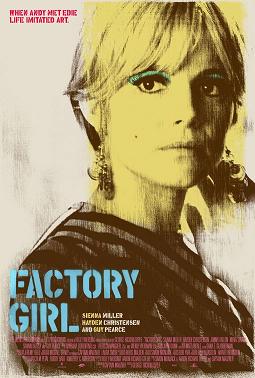
Main Page
Interviews Menu
Alphabetical Menu
Chronological Menu




In Factory Girl,directed by George Hickenlooper and written by Captain Mauzner, Sienna Miller stars as Edie Sedgwick, a young woman who rises to fame during the 1960's when she befriends artist Andy Warhol (Guy Pearce) while falling in love with a musician (Hayden Christensen) and gradually spirils downward during her struggle with drug addiction. This is Sienna Miller's first leading role. She has recently co-stared in Casanova, Alfie, and Layer Cake. Director George Hickenlooper has previously directed Mayor of the Sunset Strip and The Man from Elysian Fields. I had the privilege to interview him along with Sienna Miller and Guy Pearce. The Weinstein Company will release Factory Girl on February 2nd, 2007 at the Angelika Film Center and AMC/Loews Lincoln Square. NYC MOVIE GURU: George, what attracted you to direct Factory Girl when you first read the script? GH: What interested me when I read the script was that this love story has these two people who showed, basically, the same dynamic in terms of their relationship not just with each other, but with their familiesótheyíre both estranged. Edie was abused by her father and emotionally estranged from him. Andyís upbringings were different. He lived with his mother and had very close proximity [to her, but] his mother constantly harried him to get married and to have children, but Andy was a homosexual. So, that inability for her to accept him on his own terms, led to abandonment. When you have two children who are abandoned by parents, theyíre drawn to each other. I related to it because I dealt with the same thing in Mayor of the Sunset Strip where the radio DJ was abandoned by his mother on the Sunset Strip and finds love in the world of celebrity. In a way, I thought that Andy and Edie were metaphors for our own fragmented culture which has become so fragmented that nuclear families donít exist anymore. Andy and Edie were looking to be loved and to find love and Andy wanted to be famous, but it was more about finding that security [and] that sense of self that he never got from his mother. I was interested in making Factory Girl in purely visceral terms. NYC MOVIE GURU: How did you react when you observed Siennaís performance? GH: Sienna [Miller] really immersed herself into that role. When we were watching the first take, everyone on the set was pretty much moved to tears. It was such a challenge for her on the second day [because] the schedule was very tough. It was just about taking the time and making sure [that] we were both comfortable and that Guy [Pearce] was comfortable with what we were doing. Thatís the best thing that a director can do, particularly because my background is in documentary, which [helped to] just allow it to unfold and to happen. Both Guy and Sienna were so instrumental not only in rehearsals, but also in the process of working on the script. NYC MOVIE GURU: Sienna, how close do you feel to Edie Sedgwick? SM: In a way, I still am friends with Edie [Sedgwick]. Iíve been with this project for two years now [during which] we were developing the script and talking about [it] and trying to find the money to make the film. Having read as much as Iíve read about her, I really empathize with the way she turned out the way she did. With the right circumstances, she really could have become Marilyn Monroe. Iíd like to think that we would be friends because I can understand her a little bit. NYC MOVIE GURU: What was it like to perform the scene where you confront Andy Warhol? SM: That was a really intimidating scene because it was actually on the second day of shooting the movie. I was, obviously, very nervous about it. I didnít know anyone, but, in a way, that helped with the feeling of vulnerability. What George [Hickenlooper] has an amazing ability to do for me is to create an environment thatís very safe and very trusting so that you know that you have the ability to go as far as you want to go and itís never too far. Heís very embracing of an actorís journey and he just, sort of, made me feel protected, reassured, comforted and encouraged constantly. NYC MOVIE GURU: Where was Factory Girl shot? SM: We shot this movie in Shreveport, Louisiana and we had an incredible production designer, but itís not easy to have Louisiana double for New York which is a city with enough character as it is. Once Harvey [Weinstein] came on board and offered us the opportunity to shoot exteriors in New York and some scenes in Central Park, it was just perfect because the setting is what makes a film. NYC MOVIE GURU: Was the musician really the love of Siennaís life? SM: Guy and I and George all became friends with a lot of people who knew Andy [Warhol], including Edieís brother and her husband, Michael Post. The funny thing is that everyone has different accounts of what happened. Also, you have to remember that this was a period of time when a lot of people were doing a lot of drugs. Some people say that nothing happened at all and somebody very close said that it actually did happen that he was the love of her life. People in movies take creative license. NYC MOVIE GURU: George, according to rumors, Bob Dylan filed a lawsuit. Is this true? GH: Bob Dylan was concerned that his character would be portrayed as contributing to Edieís suicide, which isnít the case at all. [His] character is very sympathetic to Edie. There was no lawsuit filed. NYC MOVIE GURU: Sienna, how were you involved with Edieís look and did you keep any of the costumes? SM: I honestly loved every single item of clothing. Iím still battling with producers to fund it because I havenít even gotten a leotard. We had an incredible costume designer, John Dunn, who has done wardrobe for Casino. I really didnít feel the need to collaborate at all because he was such a genius. He collected a lot of vintage pieces and then copied some of Edieís clothes. It was really fun dressing up, but I didnít feel the need to intervene at all. NYC MOVIE GURU: Do you think Andy and Edie were really lovers? SM: The film opens with a quote from Andy that said that somebody in the 60ís affected [him] more than anyone, referring to Edie [Sedgwick]. Itís a very fond, loving quote. Bridget Berlin, who was a good friend of Andy [Warhol], used to tape all of her phone conversations and we actually have the phone conversation that Bridget tells Andy that Edie died. Once you listen to that, you, kind of, understand that he really did care, but he had an ability to emotionally detach. When you hear the conversation, he almost really cares, thereís a big pause, and then he says, ďWell, who gets all of the money?Ē NYC MOVIE GURU: George, would you consider Andy Warhol to be like a villain in Factory Girl? GH: He was somebody incredibly sensitive, almost too sensitive. You need to look at the film more deeply than just assuming that heís the villain. Itís a very typical response, [though, for] a lot of audience members, unfortunately, in this day-and-age. Clearly, thereís a lot more to the relationship than I was able to portray [in Factory Girl]. What Andy saw in Edie was a number of things. It wasnít just that he was a manipulator or passive aggressive. The relationship goes very, very deep, but, unfortunately, because of the personality of both [Edie and Andy], they were, kind of, unable to help each other. At the same time, Edie was really unable to help herself and Andy was really unable to, kind of, help her [because] he was so tortured by his inability to become intimate with people. His fascination with human psychology, kind of, meant that people to him who were particularly troubled. On some level, I think they began to rely on him. He was passive aggressive to some degree, but he was very much in love with Edie. NYC MOVIE GURU: Guy, what was the most surprising aspect of researching Andy Warhol? GP: The most surprising thing was that every second person I talked to claimed that they knew him, which, kind of, says something about Andy [Warhol]. I met with [poet/photographer/filmmaker] Gerard Malanga and, [also, filmmaker] Sam Green was very helpful for us on the film. Nat Finkelstein came down and shot some photographs. But, mainly, there were two people familiar really: Bridget Berlin and Vincent Freemont. Vincent had worked with Andy since 1969 and Bridget also knew him from the early 60ís. Even the people who knew Andy had a different opinion about him. You just have to let that go because it doesnít really matter what their opinion about [him] was [because] what I was trying to do was work from the inside out. What really became valuable to me were the audio tapes where you really hear Andy and Bridget for hours talking about all sorts of stuff. Hearing how they respond to one another was the most vital stuff that we worked from. Talking to everybody [who knew him] took it from the mythical and made it a reality. NYC MOVIE GURU: George, why did you briefly delay Factory Girlís release date? GH: It was a very difficult film to finance. [Producer] Holly [Wiersma] and I were passionate about having Sienna, but sheís not Meryl Streep, so itís not easy to get financing. We were able to get financing with Guy [Pearce] and Hayden [Christensen], but we were only able to raise so much money. We were supposed to raise 8 million dollars and then they kept cutting the budget under 7 [million dollars]. So, [screenwriter] Captain Mouzner and I cut pages out and we had to cut pages and we had to cut out vital little scenes. So, it was always our intention to go back and come to New York [and] that depended on who was going to buy the film and on a lot of [other] things. Once Harvey [Weinstein] bought the film, we knew we wanted to go back. All films usually have additional shooting. You look at the picture and we knew we had these 10 or 15 pages we had to shoot and Sienna had ideas, Guy had ideas, I had ideas, and Harvey certainly had ideas. The 10 pages turned into 35 pages and then Guy had to become available and Sienna had 3 other movies. They werenít available until October. Some [media sources], like Page Six, were sharpening their knives [about] ďTroubled Factory GirlĒ which irritated me to no end while I was in the cutting room. Nobody has seen [the film, so] how am I in trouble? Itís just really irritating for all of us. It was a time issue. We didnít wrap it until December 12th, [2006]. I had a week to cut a third of a movie. NYC MOVIE GURU: What did you want to get across by the additional footage? GH: [Audiences] needed to know more about Edieís past, [her] family. We wanted to take a little bit more time building Andyís relationship by showing them in Central Park and on the phone. SM: Once you understand the psychology of why she wanted to become a drug addict and why sheís still impacting my generation today, you understand that thereís more to her than what people presume. It was just a question of trying to make her sympathetic and to understand her. So, we had to work on the relationship between [her] and Andy which was actually a very loving and close relationship for a while, in order to understand the sadness at the end when they, kind of, fall apart. NYC MOVIE GURU: How do you work under pressure? GH: I always work well under pressure, but it wasnít just meóit was Sienna, it was Guy, and [everyone else]. It was very much a collaborative effort. There was nothing antagonistic. Harvey has a reputation of being ďHarvey ScissorhandsĒ, but in this case we felt he was really passionate about the project and very supportive of Guy and very supportive of Sienna and very supportive of me. We had 400 workers working around the clock doing 20-hour days and we didnít sleep at all for three weeks. We just, kind of, ran out of time. The cut that we should the National Board of Review is different from the cut we showed to the MPAA which is completely different from the cut we showed to the Academy which we didnít get [to] until three days before voting closed. We were simply filmmakers making a film under an incredible deadline. NYC MOVIE GURU: What makes Edie Sedgwick important today? SM: She was really only in the spotlight for only 2 years and sheís [still] managing to affect my generation today. Thereís something really extraordinary about somebody who has the ability to be that timeless and, therefore, there must be more to her than just being a socialite. Some of her outfits are so 80ís. Sheís so forward-thinking as was [Andy Warhol] with, kind of, preempting the reality TV that weíre so obsessed with today. I just think that she was, kind of, a performance artist and she had a magnetism that Marilyn Monroe had or Audrey Hepburn had, but she just destroyed herself. GH: Itís one of those ineffable things. Sheís certainly iconic, but sheís an underground figure [with] her passion, her need to be loved, to shine so brightly in her time, and [to be] in the right place at the right time with Andy Warhol. People werenít attracted to her just because of her fashion. I think itís because of the passion she had for life and her desire to love and be loved. Ultimately, thatís why I wanted to make the film. I wasnít interested in Andy [Warhol] as an icon or Edie [Sedgwick] as an icon; I was really interested in a love story. Main Page Interviews Menu Alphabetical Menu Chronological Menu ______________________________________________________ |
The NYC Movie Guru
themovieguru101@yahoo.com
Privacy Policy